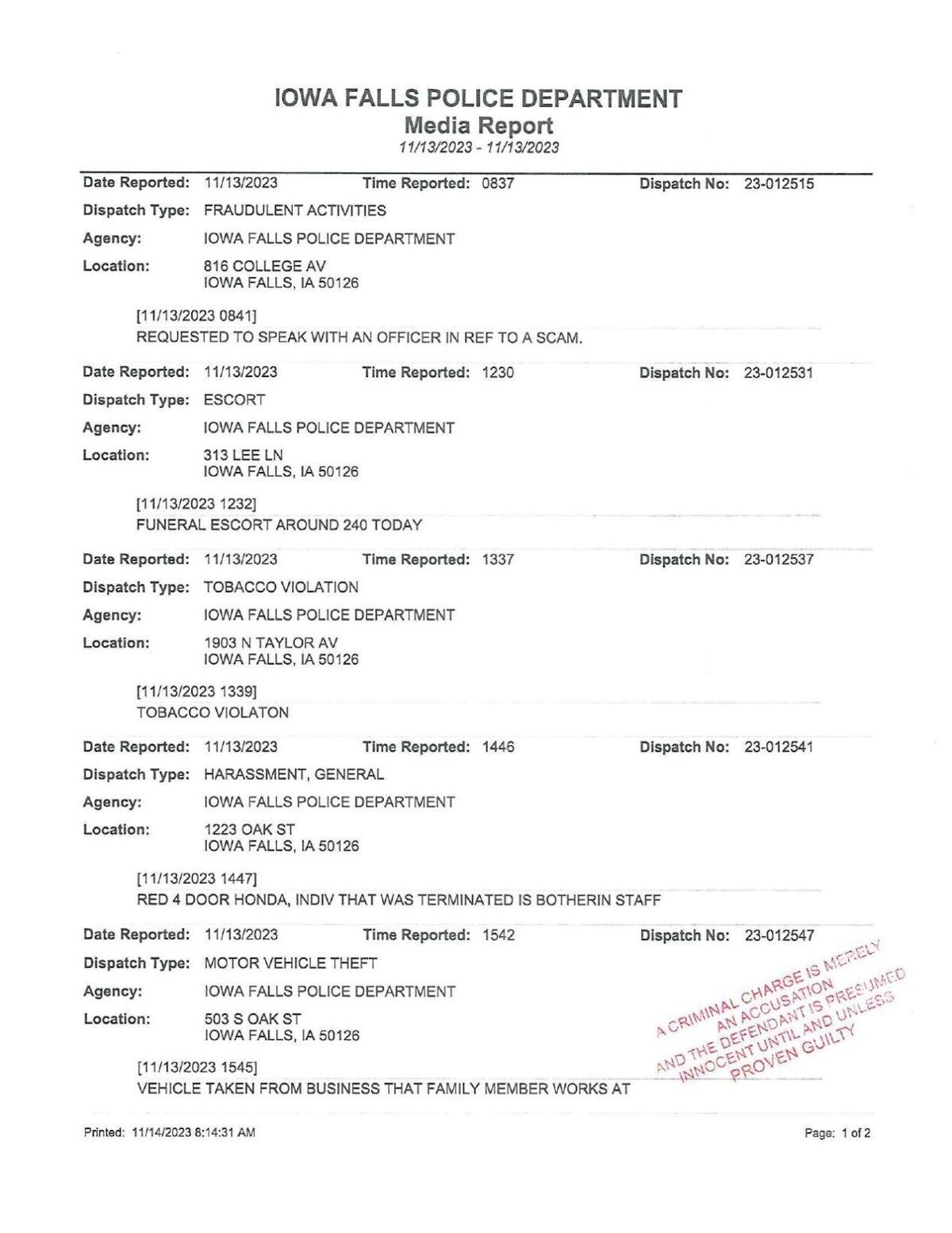Waterloo Iowa Police Log: Your Ultimate Guide To Staying Informed
Ever wondered what happens behind the scenes in Waterloo, Iowa's law enforcement world? The Waterloo Iowa police log is your ticket to understanding the pulse of the city's public safety efforts. From routine traffic stops to major investigations, this log is a treasure trove of information for anyone curious about how the wheels of justice turn in this vibrant Midwestern community. So, buckle up, because we’re diving deep into the nitty-gritty details of what makes the Waterloo police log such a valuable resource.
You’ve probably seen those crime dramas on TV where the cops jot down every little detail in their notebooks, right? Well, guess what? In real life, it’s not so different. The Waterloo Iowa police log is like a real-life version of those shows, except it’s all about the actual happenings in this city. It’s not just for crime enthusiasts either; it’s a tool for residents to stay informed and aware of their surroundings.
Whether you’re a journalist looking for the latest scoop, a concerned citizen wanting to know what’s happening in your neighborhood, or just someone who loves digging into the details of police work, this guide is here to help. We’ll break down everything you need to know about the Waterloo Iowa police log, so you can make sense of it all.
What Exactly is the Waterloo Iowa Police Log?
The Waterloo Iowa police log is essentially a public record that documents various police activities within the city. It’s a comprehensive list of incidents, arrests, and other law enforcement actions that occur daily. Think of it as a diary of sorts, but instead of personal musings, it’s packed with official reports that paint a picture of the city’s safety landscape.
This log isn’t just some random document buried in a dusty file cabinet. It’s a crucial part of transparency in law enforcement. By making these records available to the public, the Waterloo Police Department ensures that citizens are kept in the loop about what’s happening in their community. It’s all about trust and accountability, and the police log plays a big role in fostering that relationship.
Why Should You Care About the Police Log?
Here’s the deal: knowing what’s going on in your city is more than just being nosy. It’s about staying safe and informed. The police log can alert you to potential dangers in your area, like a spike in break-ins or a new gang activity. It’s like having a personal neighborhood watch, but with official documentation backing it up.
Plus, if you’re a journalist or researcher, the police log is a goldmine of information. It’s your go-to source for the latest crime trends, police procedures, and community interactions. Whether you’re writing an investigative piece or conducting academic research, the Waterloo Iowa police log has got your back.
How to Access the Waterloo Iowa Police Log
Getting your hands on the police log is easier than you might think. In today’s digital age, most police departments, including Waterloo’s, have embraced technology to make public records more accessible. You can usually find the police log on the official website of the Waterloo Police Department or through a public records request.
If you prefer the old-school method, you can always visit the police station in person. Just bring some ID and a willingness to fill out a few forms, and you’ll be good to go. Some cities even offer subscription services where you can get updates straight to your inbox. Talk about convenience!
Top Tips for Navigating the Police Log
- Start by familiarizing yourself with the layout. Most logs are organized by date, time, and type of incident.
- Use keywords to search for specific events or locations. This can save you a ton of time when sifting through large amounts of data.
- Don’t be afraid to ask questions. If something seems unclear or vague, reach out to the police department for clarification.
Understanding the Importance of Public Records
Public records like the Waterloo Iowa police log are more than just documents. They’re a reflection of how our society operates. By making these records available, governments promote transparency and accountability. It’s a way of saying, “Hey, we’re doing our job, and here’s the proof.”
For residents, having access to public records empowers them to be active participants in their community. It’s not just about knowing what’s happening; it’s about understanding why it’s happening and what can be done about it. Whether it’s advocating for policy changes or simply being more vigilant in your daily life, public records give you the tools to make informed decisions.
Challenges in Maintaining Transparency
Of course, maintaining transparency isn’t always a walk in the park. There are challenges, like protecting sensitive information or ensuring that records are updated in a timely manner. But despite these hurdles, the benefits far outweigh the drawbacks.
For instance, imagine a situation where a major crime wave hits the city. Without a public record like the police log, residents might be left in the dark, unsure of how to protect themselves. But with the log, they can see the patterns, understand the risks, and take appropriate action. That’s the power of transparency in action.
Exploring the Impact of Police Logs on Community Safety
So, how exactly does the police log impact community safety? Well, for starters, it provides valuable insights into crime trends. By analyzing the data in the log, law enforcement agencies can identify hotspots and allocate resources more effectively. It’s like having a roadmap for where to focus their efforts.
Residents also benefit from this information. Knowing which areas are prone to certain types of crimes can help them make smarter decisions about where to live, work, or even take a walk. It’s all about being proactive rather than reactive when it comes to safety.
Case Studies: Real-Life Examples of Police Log Impact
- In one instance, a neighborhood in Waterloo noticed a rise in car break-ins after reviewing the police log. They quickly organized a neighborhood watch program, which led to a significant decrease in such incidents.
- Another case involved a local business owner who used the police log to implement better security measures after noticing a pattern of thefts in the area.
Data and Statistics: The Numbers Behind the Log
Numbers don’t lie, and when it comes to the Waterloo Iowa police log, they tell a compelling story. According to recent statistics, the log documents an average of 50 incidents per day, ranging from minor traffic violations to serious crimes. This data helps paint a clearer picture of the city’s overall safety profile.
For example, did you know that thefts account for nearly 30% of all incidents reported in the log? Or that traffic violations make up another 25%? These numbers aren’t just random facts; they’re valuable insights that can guide both law enforcement strategies and community initiatives.
How Data Shapes Policy and Practice
Law enforcement agencies rely heavily on data from police logs to shape their policies and practices. By analyzing trends and patterns, they can develop targeted interventions that address specific issues. It’s like having a crystal ball that predicts where problems might arise and how to prevent them.
For instance, if the log shows a spike in domestic violence calls during certain times of the year, the police department might increase patrols or offer additional support services during those periods. It’s all about using data to make smarter, more effective decisions.
Legal and Ethical Considerations
While the Waterloo Iowa police log is a valuable resource, there are legal and ethical considerations to keep in mind. Privacy is a big concern, especially when it comes to sensitive information. Police departments must strike a balance between transparency and protecting individuals’ rights.
There are also ethical implications to consider. For example, how does the log impact public perception of certain neighborhoods or demographics? It’s important to ensure that the information is presented in a way that’s fair and accurate, without perpetuating stereotypes or biases.
Best Practices for Handling Police Logs
- Always respect privacy laws and guidelines when accessing or sharing information from the police log.
- Use the data responsibly and ethically, avoiding any actions that could harm or discriminate against individuals or communities.
- Stay informed about updates and changes in laws and regulations regarding public records to ensure compliance.
Conclusion: Why the Waterloo Iowa Police Log Matters
In conclusion, the Waterloo Iowa police log is more than just a collection of reports; it’s a vital tool for promoting transparency, accountability, and community safety. Whether you’re a concerned citizen, a curious researcher, or a dedicated journalist, the police log offers valuable insights into the workings of law enforcement in this vibrant city.
So, what’s next? Take action! Dive into the police log, explore the data, and use it to make informed decisions about your community. Share this article with friends and family, and encourage them to get involved too. Together, we can create a safer, more informed Waterloo, Iowa.
Table of Contents
- What Exactly is the Waterloo Iowa Police Log?
- How to Access the Waterloo Iowa Police Log
- Understanding the Importance of Public Records
- Exploring the Impact of Police Logs on Community Safety
- Data and Statistics: The Numbers Behind the Log
- Legal and Ethical Considerations
Remember, the power of knowledge is in your hands. Use it wisely, and let’s make Waterloo, Iowa a safer place for everyone.

Waterloo, Iowa Police Department

Police Department The University of Iowa

Nov. 13, 2023 Iowa Falls Police Log